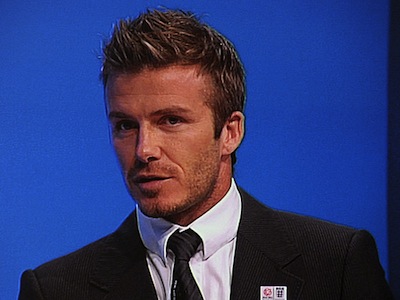Burger King’s new ad featuring famously handsome soccer player David Beckham is a risky but refreshing marketing shift for the company. Hugo Schwyzer compares it to BK’s previous campaigns and applauds the brand for its subtle nod to same-sex male attraction.
Just a few short years ago, Burger King, their sales slumping, ran their infamous “I am Man” ads. The ads celebrated rebellious masculine carnivorousness with such vigor that some thought they were a campy parody; alas, they were all too real. The commercials failed to revive BK’s fortunes, a predictable result of a campaign that insulted men and completely ignored their female customer base.
Times change. Having ditched the machismo and their iconic king, BK is back with a new round of advertising, focusing on their expanded, lighter, less meat-focused menu. One new ad features David Beckham attempting to order a Real Fruit Smoothie. The woman behind the counter is so smitten by Becks she freezes; when her older male manager comes to assist, he too falls for the charm of the globe’s most famous soccer player.
Mark Simpson, who coined the term “metrosexual” nearly 20 years ago, writes on his blog that the ad plays up the “omnisexual appeal of the metrosexual pin-up. The middle-aged male manager also finds himself captivated by Becks’ beauty midway through saying ‘I am sorry, David, we make them fresh every time with…fruit.’ It’s unclear whether the manager is actually a ‘fruit’ himself or just another straight man who finds himself strangely drawn by Beckham’s beguiling looks.”
Whatever your own view of Beck’s appeal, there’s no denying that he’s still perhaps one of the world’s most universally recognizable objects of desire. If any man on the planet has crossover appeal of the kind that makes straight men blush, it’s the aging but still chiseled footballer from Chingford. (In America, where soccer is gaining market share but still struggling, Becks is more “famous for his fame” than for his game.) Though Simpson thinks the “fruit” reference might be a clumsy signal that the manager is gay, the ad seems subtler than that. The fact that the supervisor calls him by name signals that he already recognizes him—but only when he looks into Beckham’s eyes does he become befuddled. That suggests the manager is struck by another man’s beauty, not by his celebrity.
It’s all played for laughs, with Becks himself getting another excellent payday spoofing his own appeal. But the teasing hint of same-sex attraction isn’t just mildly funny; it’s dangerous and brave. Fast food advertising is designed to appeal to a huge demographic; the trick is always to be clever without alienating customers. (Hence BK’s quick decision to rethink the “I Am Man” campaign.) The new Burger King menu may be a frantic effort to rebrand the company as more health-conscious (and friendlier to women); in that context, hiring David Beckham as a spokesperson makes perfect sense. But why court potential homophobic backlash with an ad playing on same-sex male attraction?
I suspect that Burger King is taking a calculated risk, gambling that their target demographic’s views on sexuality have shifted dramatically in recent years. (Polling shows that the American public, like its president, is rapidly “evolving” toward greater and greater acceptance of gays and lesbians.) At the same time, the company knows that despite this positive shift, same-sex desire is still taboo in mainstream advertising. So BK gets edginess credit for hinting at the fluidity of male sexuality while remaining confident that the goofy innocuousness of the ad will protect them against conservative criticism that they’re actually promoting the “gay agenda.”
The Real Fruit Smoothie may or may not be a great thirst-quencher. But compared to what BK was putting on air just a few short years ago, this ad is certainly refreshing.
Hugo Schwyzer has taught history and gender studies at Pasadena City College since 1993, where he developed the college’s first courses on Men and Masculinity and Beauty and Body Image. A writer and speaker as well as a professor, Hugo lives with his wife, daughter, and six chinchillas in Los Angeles. Hugo blogs at his eponymous website and co-authored the recent autobiography of supermodel Carré Otis, Beauty, Disrupted.
Photo credit Downing Street/Flickr
Related Links:

